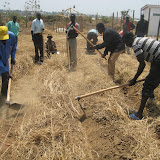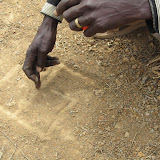We have had three U.S. doctors here for a week, in part so that two of them (husband and wife) could continue their discernment about whether God might be calling them to Sudan next year. Diantha and I really hope so. They are particularly interested in improving the rural health situation, including preventing sickness through improving health practices in the community, which is our focus as well, and it was greatly encouraging to us and especially to Diantha to think we might have colleagues to work with on this. Diantha and I urged that their schedule while they were here should include some meetings with women and others from the villages to ask them about the health situation in the villages, and to answer their questions about medical matters. The three such "hearings" (plus another with the United Methodist pastors) were great, though exhausting. One piece of good news we gleaned was that the WaSH --Water, Sanitation, Hygiene -- training Diantha has been doing is well accepted and appreciated. The bad news was the reminder that the cost of medicines, of getting to the clinics in the main city of Yei, and of the clinic fees is prohibitive to most people. Time and time again the doctors' answer to a medical question quite rightly was, "You need to go to a clinic and be seen." It really came home to me that the only way that this huge barrier will be overcome in the long run is to help people increase income so they can afford these costs; this is another way my agricultural and economic development work is connected to the crucial work of improving health. And another distressing bit of news was that almost no one in the villages we visited had bed nets! The exception was those pregnant women who went to prenatal appointments (not all did) and got one bed net. The NGO that was giving them out free last year has ended that program. Diantha and I will begin some fundraising right away to buy 5 or 10 bednets at least for each of the 17 villages we are working in.
To relax last night, we watched a movie the Hankins brought with them, K-PAX. It was a powerful reminder of the huge impact of personal trauma (one character's wife and daughter are killed) on an individual's ability to cope and live in reality. My immediate thought during the movie was that we are living among a whole people under this kind of Post Traumatic Stress. So many here (estimates are about 50%) have experienced such a trauma, and it can't help affecting the way they live and relate to each other and to us. So many have seen family and friends brutally killed, seeing neighbors fight over resources in the refugee camps and the bush where they have been for 20+ years, so many have felt and still feel left behind or feel guilty for leaving someone behind, so many have been treated as less than human by not only by enemy soldiers but sometimes the host population around the refugee camps. While I know some of what surprises us here is a matter of a different cultural attitude toward money and relationships that we are learning to respect, still I wonder if widespread PTSD -- or something like it -- at least partly explains some of things we've noticed as we've gotten to know people here: the fear of being forgotten, mistrust of each other (and us), difficulty in accepting rules and authorities, and grabbing resources for oneself at the expense of others. I suspect that the implications for our life here include (1) be very patient with people even when they disappoint us (2) make it clear again and again that we are here for several years to devote time, knowledge and some resources into a series of developments they think are important (3) follow through on anything we promise to do and not promise anything we can't do (4) continue working hard at building friendships and relationships that are genuine and respectful. To do these things I think we'll have to make a serious commitment to listen, especially before we speak; a listening that includes learning about their culture, and a listening that includes trying to take into account the traumas of their lives.
Sunday, November 7, 2010
Subscribe to:
Comments (Atom)















